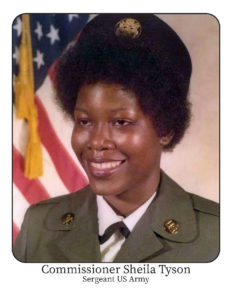
Sheila D. Tyson, elected commissioner in Jefferson County (Alabama), has never been missing in action. Her achievements include 17 years in the U.S. Army, where she rose to the rank of Sergeant. This Veterans Day we shine a spotlight on Tyson, holding proxy for the untold ranks of Black women veterans.
According to the latest data, Black women represent 19% of the 2.1 million living women veterans, proportionately outpacing every demographic group. Just 6% of the U.S. population, in 2018 Black women made up 29% of the armed services active-duty enlisted troops.
“The Army was my ticket to college,” said Tyson who served from 1979 to 1996. “I remember hearing presentations from the military in some of my high school classes and it really stuck with me that this is the way that I could pay for an education.”
After discharge, Tyson took on political and community activism as a member of the Birmingham Citizens Advisory Board, leading that body to mobilize voting rights for Black citizens, especially formerly incarcerated populations. She also leads the Alabama Coalition on Black Civic Participation and the affiliated Black Women’s Roundtable.
She traces many of those leadership strides to the decision to take a chance on the Army. Track back to the post-Vietnam War era when Tyson enlisted. The women’s rights movement was flexing new muscles, but the military was still doggedly entrenched in sexism, misogyny and unchallenged gender exclusion.
“Harassment of all kinds existed and people were still very open about their bias against Black people, especially dark-skinned Black people,” Tyson remembers. “This was a culture shock for me, because my home community protected me from these things. I’ve always been a fighter and not afraid to stand my ground. It was different in the military.”
While the vestiges of sexual harassment and sex discrimination are still deeply rooted, the armed forces have made strides in modernizing old racist practices such as the ban on popular Black hairstyles in 2014 and confronting barriers to health and housing. There are an estimated 38,000 veterans nationwide without stable housing, of which one-third are Black.
Commissioner Tyson proposes some policy reforms that would benefit Black women veterans. “We should automatically be granted disabled veteran status, because many of us need interventions for physical and mental health disabilities sooner rather than later. Housing should be an immediate priority as well.”
Black women veterans continue to stand for service and action. To learn more, visit the National Association of Black Military Women.
To learn more about Sheila D. Tyson, visit our PrimeTime55.com directory.



